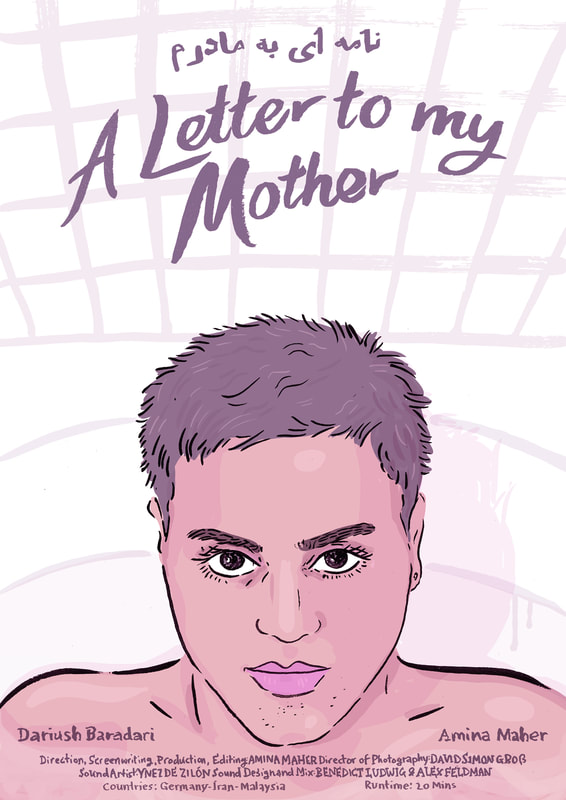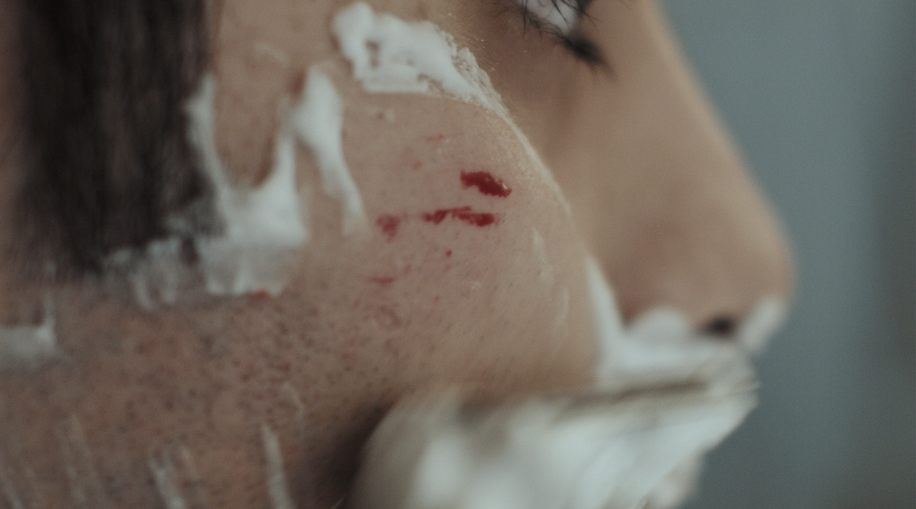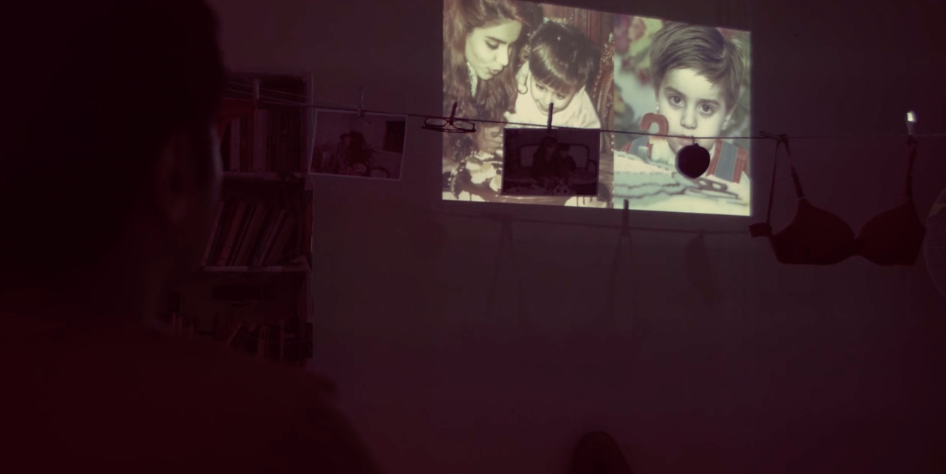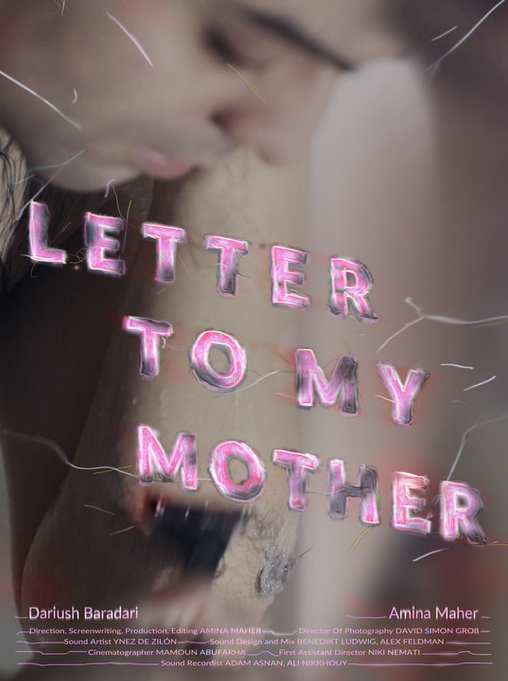|
Amina Maher (b. Tehran, 1992) is an Iranian queer filmmaker whose works deal with themes of social taboos and gender-identity in relation to violence and power structure. She began her cinematic activity as the main protagonist in Abbas Kiarostami's "Ten” which featured the real-life relationship between Amina and her mother. Her first short film was Sweet Gin and Cold Wine, followed by Orange. Her multi-awarded short film, Letter to my mother, was part of the competition at numerous international film festivals such as 36th Kasseler Dokfest, 35th Lovers Film Festival, 34th Mix Milano Film Festival and 26th Cheries Cheris, LGBTQIA+ Film Festival, Paris. Among numerous reviews, the film was described as a means for survival, a way to stand up and to understand – a fearless and strong examination that touches upon the centre of the pain and dares to look precisely. َAmina currently studies her MA in directing at Babelsberg University Konrad Wolf
https://www.aminmaher.com https://www.instagram.com/aminamaher.real/ https://www.instagram.com/lettertomymotherfilm/
Interview questions by Eleni Tongidou
1. In the film there is a depiction of your life in the past, present and in the subconscious. In regards to the latter a symbolically rich vocabulary is employed. What were your references/inspirations for creating your imagery?
I am not scholar but a free thinker who enters to the darkness of unconscious to visualize the honest emotions where there are different rooms of traumas in this darkness. In Letter to My Mother, I open the door of one of them, and visualize this trauma. I would love to freely experience and use any different types of imagery that could visualize the story, that could also visualize shame, guilt and what happens in the unconscious, which can open doors to new discovery. Therefore, in a complex montage, I used different types of imagery: 1. Metaphorical and poetic imagery such as shaving 2. Re-creation such as waking up from the nightmare. 3. Dream scene or Nightmare imagery such as the nightmare with boobs and penis. 4. Fast sequences of recalling a memory/trauma 5. Archive 6. Documenting reality or filming in real time such as the skype Conversation with the therapist. I want to free my mind from boundaries and limitations. If I really and purely struggle to free myself from the shackles of normativity and the shackles of taboos and traditions, then I cannot accept boundaries and limitations for telling stories. This must happen both in form and content. In Letter To My Mother, the shaving of my body became a metaphor for exculpating myself from traumatic events. It became a metaphor to overcome my fears, to be able to stand up, speak out and understand. In the film, simply I shave my whole body and only then I look directly to the camera and break my silence that I had been raped. Before that I cannot talk directly to my mother, only my voice-over narrates, starting with shaving my face and telling my mother that I hurt myself. When I enter the bathtub and I start to shave my body, my voice over narrates that I feel guilty that I enjoyed it. It continues, I feel shameful, talking about it. Then there is a long silence. When I finish shaving, I overcome the shame and fear to break my silence and speak out to the camera, directly and loudly. Similarly, dressing as a woman became a metaphor for freeing myself from the patriarchal patterns and heteronormative masculinity from one side and from another side to relive the darkest parts of my experience. I struggle to free myself from the vicious circle of being either a victim or rapist. And then I ask this question, why a victim wears a female dress, and the rapist is hairy? In my whole life, I have constantly struggled to not be part of this circle. I aimed to explore this metaphorical imagery and poetic style. Shame, guilt, and the psychological consequences of the abuse was explored through abstract and metaphorical imagery. For me it was important to think about how to represent shame, guilt, and repression. I asked myself to tell the rape story, is it enough just to say that I was raped and what rape has done to me? For me it was not. I wanted to visualize the anxiety, repression, and psychological consequences of rape. In other words, I wanted to enter to my own aspects of psyche, how do these nightmares and self-destructive thoughts look and feel? I asked myself is this a traditional investigative documentary movie that I show the court which could not take place? These stories are also interesting, but I am tired of censoring myself and my pure feelings. I believe this narrated format which can be considered to be auto-ethnographic experimental, documentary or hybrid in form is a means to engage with and explore the most private aspects of one’s psyche. I was more interested in psychological aspects of the story. When it comes to the discourses of human rights such as the rights of the survivors of rape, these psychological aspects are often not considered or understood enough. Issues of shame and blame may never be fully resolved, and I undertook this project with the awareness that it must be approached intuitively rather than prescriptively. These difficulties were a central part of the project and were dealt with as such. For me sensitive topics such as sexual violence and abuse must be addressed accurately. Without considering important subjects such as psychological consequences of abuse and violence, the film cannot shed light on the issues of justice and power which are not usually considered enough in different discourses of human rights such as the struggles of queer identities and the rights of survivors of rape.
2. The film navigates the vast yet fragile space between self-exploration and family politics within a sociocultural frame. What personal intentions did you set on your social compass to communicate to the wider audience?
For me art is the best alternative to revenge and the most humanistic way of revising injustices. I realized that I have to say "No" to both shame and revenge. And that was my way of survival. I felt able to give an insight to my experiences and to create art and life out of them. I felt the power to break taboos and push boundaries both social and personal and I felt the necessity of that. As we all know, sexual topics have been always repressed globally and there are numerous unreasonable taboos with which we deal regularly. When you make an auto-ethnographic film, you must be able to dare and witness, to even lose and give away. What is usually referred to as "life" I have already lost; I allowed it; I wanted it to be lost. I film only because this drive to film has become a necessity for me. 3. You are wearing many hats for the making of this film. I found interesting that whilst your mother could remain an off-screen character, she indirectly appears in the film. That enhances the element of volatility for the viewer, who also gets to know you in that significant age. What stood behind the decision of incorporating those scenes? Well, the film is a letter to the mother, it is about sharing dark childhood experiences. It is important to see that child, to see the past of the grown-up body full of hairs that are being shaved. It was important to hear the dialogues of the mother and child. The film Ten is the document of our past. I did not know the camera was on recording me. So, it is a document to observe my childhood and the relationship of my mother and me in the car driving in Tehran. And it had also a very nice contrast with the scene where a blond woman wears make up and we talk in English.
4. A beautiful metaphor of wearing a new skin and the process of metamorphosis were at the core of the narrative. Was the making and/or completion of this film in some way a form of catharsis for you?
Well, only in some ways, yes. I released the repressed emotions through making this film. It was a means for survival. It caused me to understand myself and my society better. And that requires honesty, personal observation and analysis that came through my filmmaking techniques. 5. Are you currently working on new projects? What are your plans for the future? Yes, I have a short film in post-production. We are at the early stages of financing and development with my first feature film which is again an auto-ethnographic movie, dealing with the themes of gender-identity and rape culture from one side and again the battle between justice and power from another.
Playlist by Amina Maher
|
Tips and Picks from our collective members and featured artists!
Hand-picked short films and interviews with filmmakers. Free streaming (for a limited time) and 5 questions answered by the filmmakers. Contributers
All
|



